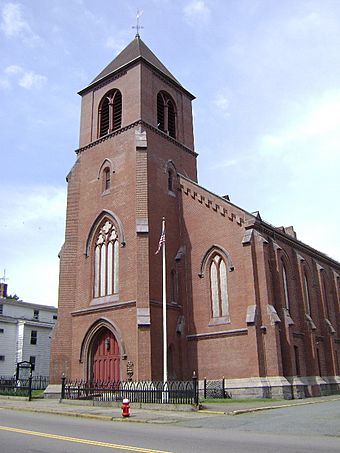Winthrop Street Baptist Church facts for kids
Quick facts for kids |
|
|
Winthrop Street Baptist Church
|
|
 |
|
| Location | Taunton, Massachusetts |
|---|---|
| Built | 1862 |
| Architectural style | Late Gothic Revival |
| MPS | Taunton MRA |
| NRHP reference No. | 84002291 |
| Added to NRHP | July 5, 1984 |
The Winthrop Street Baptist Church is a historic church building in Taunton, Massachusetts. It is located at 39 Winthrop Street. This beautiful church was built in 1862. It is known for its Late Gothic Revival style of architecture. The church was added to the National Register of Historic Places in 1984 because of its historical importance.
About the Church Building
The Winthrop Street Baptist Church stands on the west side of Winthrop Street. This street is also known as United States Route 44. The church is located across the Mill River from downtown Taunton.
What the Church Looks Like
The church is a single-story building. It is made of brick with special brownstone decorations. It has a pointed roof, called a gable roof. A square tower sticks out from the front of the church, which faces east.
The main entrance is at the bottom of this tower. It is shaped like a Gothic arch. This arch has a decorative stone trim called drip molding. Many of the church's windows also have this Gothic style and molding. The tower has strong supports called buttresses at its corners. The sides of the church building also have these buttresses.
Above the main entrance, in the tall part of the tower, there is a large stained glass window. It is also shaped like a Gothic arch. Above this window is the belfry, which is where the church bells would be. The belfry has arched openings with slats. The tower is topped with a pyramid-shaped roof.
History of the Church
The Winthrop Street Baptist Church was built in 1862. It is considered one of the best examples of church architecture from the mid-1800s in Taunton.
However, a part of its original design was changed. In 1994, the church's original tall steeple was taken down. Because of this change, the local historical group believes the church might no longer qualify for the National Register of Historic Places.
See also
 | Claudette Colvin |
 | Myrlie Evers-Williams |
 | Alberta Odell Jones |



